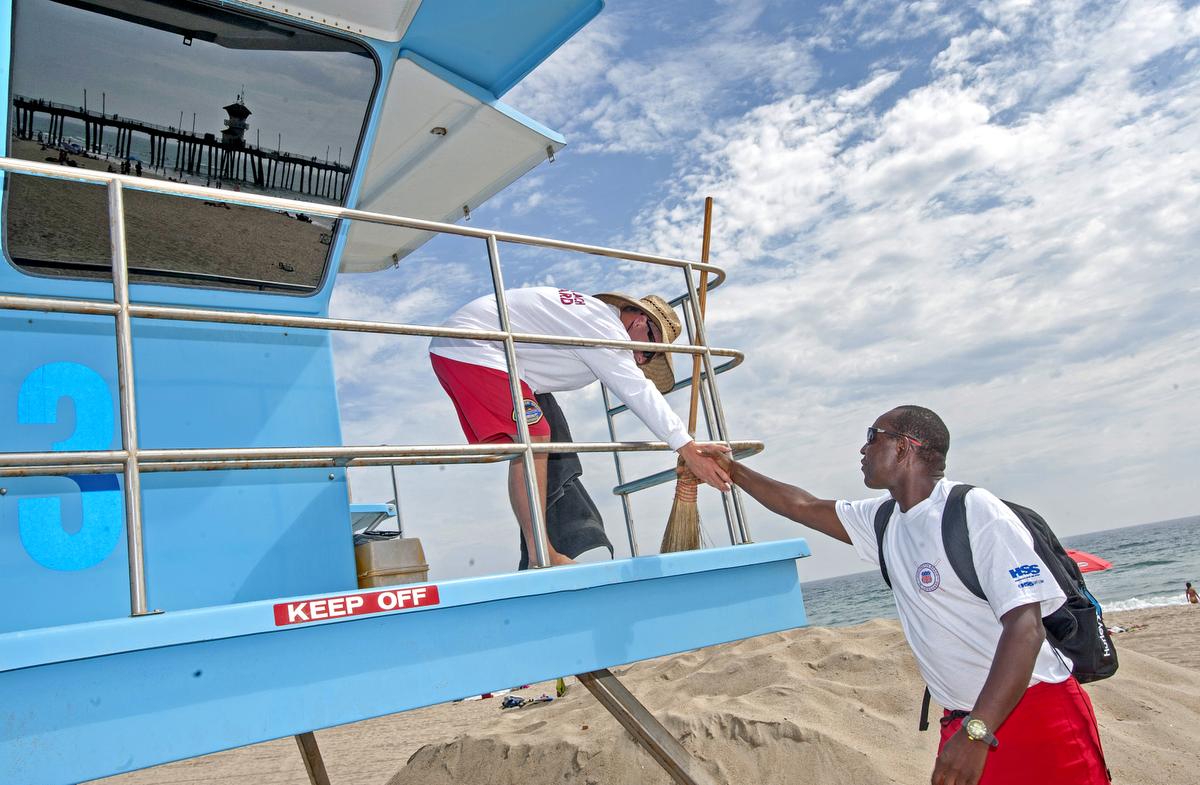 Huntington Beach lifeguard, Travis Johnson, left, greets Felix Uzor, 45, a lifeguard from Ghana, who is in town to shadow the Huntington Beach lifeguards and learn how he might keep beaches safer in his native country.MICHAEL GOULDING, STAFF PHOTOGRAPHER
Huntington Beach lifeguard, Travis Johnson, left, greets Felix Uzor, 45, a lifeguard from Ghana, who is in town to shadow the Huntington Beach lifeguards and learn how he might keep beaches safer in his native country.MICHAEL GOULDING, STAFF PHOTOGRAPHER
It’s a scene that plays out on Huntington Beach shores far too often.
A swimmer is sucked out into the ocean by a strong rip current, and panics as they try to get back to shore. A lifeguard scanning the ocean sees the struggling swimmer, calls for back up and rushes to help.
By the time the back-up arrives a minute or so later, the swimmer is safe on the sand.
Felix Uzor, a 45-year-old lifeguard from Ghana, was taking note of the quick and coordinated responses by lifeguards in Huntington Beach this week. It’s a lesson for the African, who has spent the last month traveling around the United States to learn how to make his shores safer back home.
“We are far, far behind,” said Uzor, who wrapped up his two-day lesson in Huntington on Tuesday.
In Huntington Beach, more than 60 lifeguards watch over 3.5 miles of shoreline on a busy summer day. On the other side of the world in Ghana, where they have about 350 miles of coastline, they’d be lucky to have five guards watching over the busiest of beaches, Uzor said.
The average number of drownings each week in Ghana? 15. So far this year, 300 people have died there from drowning. And those are just the incidents that were reported.
After his training sessions were over, a soft-spoken Uzor, wearing bright red lifeguard trunks, sat down in the conference room of the lifeguard headquarters and spoke about the challenges his country faces and how he can help.
Originally from Nigeria, he went to England for about 10 years to work as a lifeguard and study sports fitness. When he returned to Africa in 2010, he set up Felix Fitness and Sport, which teaches swimming, aqua aerobics and football.
But with his background as a lifeguard, he couldn’t help but notice the rampant number of drownings, he said. So he set up the Felix Fitness Foundation, with 10 percent of his fitness business funding the nonprofit that trains community lifeguards, leaders and children how to prevent drowning.
Providing lifeguards for the beaches hasn’t been a priority for the government in Ghana. The country faces severe poverty, with government efforts mostly focusing on health issues such as HIV, Ebola or malaria, Uzor said.
When a big storm with massive flooding hit a few months ago and caused 150 drownings – just in the capital of Accra – Uzor met with community leaders to discuss how they could make citizens safer.
U.S. Embassy leaders in Ghana had an idea. Provide Uzor with a five-year visa to the United States to brainstorm with the best lifeguards. The International Surf Lifesaving Association, a non-profit based in Huntington that sends volunteers to impoverished countries to train lifeguards, helped coordinate his trip.
“It’s super valuable for him to see what we do and all the different things and the resources we have,” said Henry Reyes, a Huntington Beach lifeguard and president of ISLA. “It’s going to do wonders when he goes back and takes an inventory of his resources and how he can apply that to fit the same model.”
Uzor started earlier this month on the East Coast in Florida, making his way up to North Carolina before arriving in Surf City. He’ll soon head to Malaysia, where lifeguards are hosting the World Conference on Drowning Prevention, with hopes of coming back to the U.S. next year.
In Huntington Beach, he spent a day in the tower to shadow operations. In Ghana, guards sit in a chair, shaded with an umbrella, and watch a swim area between two flags, he said.
Later, he jumped on a boat to see how rescues happen from the water. Ghana has no rescue boats or trucks to respond quickly to possible drownings.
Combine that lack of resources with a majority of the population not knowing how to swim because access to pools is expensive and a culture that allows drinking on the beach, and it’s a recipe for disaster.
“It’s like suicide,” he said. “After they drink, they run into the water. They don’t understand rip currents and a majority don’t know how to swim. That is the African culture, that is the problem. That is the gap we are trying to bridge.”
Still, Uzor sees hope.
He’s trained over 20 volunteer lifeguards so far. And he has connected with the local fisherman, who he compared with our surfers – people on the front lines who are ocean savvy and can quickly help a person in trouble. He is teaching them CPR and first aid.
Huntington Beach Lifeguard Lt. Mike Beuerlein said it was eye-opening to see the challenges Ghana faces.
“They have a lack of resources, training and equipment,” he said. “They are doing the best they can with what they have.”
Beuerlein said Uzor is on the right track by building youth programs and going to classrooms to teach ocean safety.
Uzor said he will keep pushing to find answers, because lives depend on it.
“I want to leave a legacy back in Africa,” he said. “I want one day, if I’m going to die, (to know) that I was involved with something good, and I will die happy and peacefully.
“It’s big, but we will get there.”


